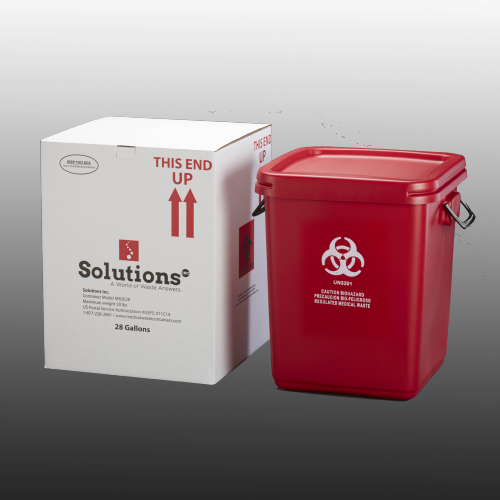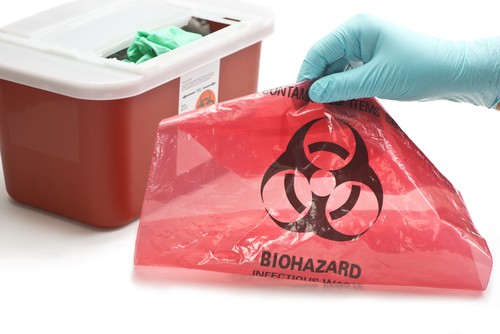Reliable Medical Waste Disposal Services: Securing Your Center's Wellness
Wiki Article
Accountable Solutions: Understanding Medical Garbage Disposal Provider
In the realm of healthcare, the correct disposal of medical waste is a critical element that requires mindful consideration. As healthcare facilities produce different kinds of waste that require specific handling, comprehending the nuances of medical waste disposal solutions is vital.Significance of Appropriate Clinical Waste Disposal
Correct clinical garbage disposal is important in maintaining a risk-free and hygienic environment within medical care centers. In medical care setups, numerous sorts of waste are created daily, including infectious materials, sharps, ended drugs, and chemical materials. If not appropriately handled, these wastes can position major dangers to both healthcare workers and the basic public. Inappropriate disposal can lead to the spread of infections, injuries from sharps, contamination of water sources, and harm to the atmosphere.

Types of Medical Waste
Within health care facilities, a varied array of waste products identified as medical waste is produced, each requiring certain handling and disposal techniques. Pathological waste, which includes tissues, organs, and body components, requires proper disposal to respect the dignity of the deceased and protect against any biohazards. Recognizing the various types of clinical waste is important for health care centers to apply reliable waste administration techniques and safeguard public health and the setting.Laws and Conformity
Health care facilities should abide by rigorous laws concerning the handling and disposal of clinical waste to ensure compliance with legal requirements and secure public wellness. These policies are established to prevent the spread of infections, safeguard the environment, and preserve the safety of health care employees and the general public. Different governing bodies, such as the Epa (EPA), the Occupational Safety and Health Management (OSHA), and the Department of Transport (DOT), have certain standards that medical care centers need to adhere to.To follow these laws, medical care facilities have to effectively segregate, store, transportation, and take care of different types of clinical waste. This consists of sharps waste, infectious waste, dangerous waste, and pharmaceutical waste, each requiring details taking care of treatments. Facilities should also keep precise records of waste generation and disposal to show compliance throughout inspections.
Non-compliance with medical waste laws can cause severe penalties, penalties, and damage to the facility's reputation. It is necessary for medical care centers to stay educated regarding the most recent regulations and apply robust compliance measures to secure public health and wellness and the atmosphere.
Benefits of Specialist Disposal Solutions
Engaging specialist clinical waste disposal services provides healthcare facilities a trustworthy and effective service for taking care of dangerous products. These solutions employ trained specialists who are well-versed in handling different types of clinical waste, making certain proper partition, disposal, transportation, and product try these out packaging. Medical Waste Disposal Services.In addition, specialist disposal solutions use state-of-the-art devices and follow industry finest methods to lessen environmental effect and minimize the danger of contamination. This not only promotes a much safer workplace for health care personnel but likewise adds to general public health and wellness and security. In addition, outsourcing clinical garbage disposal can result in cost financial savings over time by eliminating the need for in-house administration and disposal systems.
Sustainable Practices in Healthcare

One key lasting practice in health care is waste decrease. By implementing methods to minimize useful site unneeded product packaging, single-use items, and total waste generation, medical care facilities can considerably reduce the amount of waste sent to landfills or incineration. Additionally, reusing programs for products like paper, plastic, and glass can even more reduce the ecological impact of health care operations.

Final Thought
To conclude, proper clinical waste disposal is vital in preserving a safe and have a peek at this website healthy environment for both medical care workers and the public. Understanding the different kinds of medical waste, following guidelines and conformity standards, and using professional disposal solutions are necessary actions in responsible waste administration. By adopting lasting techniques in healthcare facilities, we can decrease ecological effect and guarantee the health of all individuals associated with the medical care market.As health care facilities produce various types of waste that call for specific handling, comprehending the nuances of medical waste disposal solutions is extremely important.Within medical care facilities, a diverse range of waste materials identified as medical waste is created, each requiring particular handling and disposal methods. Understanding the different types of clinical waste is vital for healthcare facilities to execute effective waste monitoring methods and protect public health and wellness and the atmosphere.
By implementing approaches to lower unnecessary packaging, single-use items, and general waste generation, medical care centers can significantly reduce the amount of waste sent to landfills or incineration. Comprehending the different types of medical waste, following policies and conformity requirements, and using professional disposal services are necessary steps in accountable waste administration.
Report this wiki page